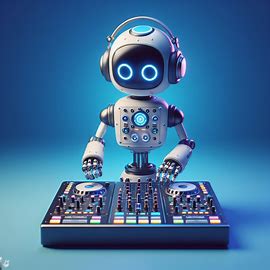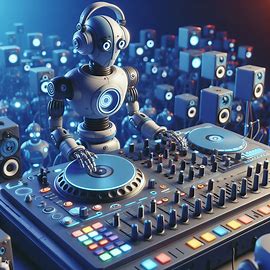Introduction
In this article, we will explore how AI song generator can help musicians and artists create and produce music, and what are the benefits and challenges of using AI for music. We will also introduce some of the best AI song generator tools that you can use to create your own music with AI.
Music is one of the most universal and expressive forms of art, but it is also one of the most challenging and complex ones. Creating music requires a combination of skills, knowledge, creativity, and inspiration, which are not always easy to acquire or access. Moreover, music production involves various processes, such as composing, arranging, recording, mixing, and mastering, which can be time-consuming, costly, and technical.
However, thanks to the advances in artificial intelligence (AI), music creation and production are becoming more accessible, affordable, and innovative than ever before. AI is a branch of computer science that aims to create machines or systems that can perform tasks that normally require human intelligence, such as learning, reasoning, or decision making. AI can also refer to the machines or systems that exhibit such intelligence.
How Does AI Song Generator Work?
AI song generator is a software application that uses AI algorithms to generate music based on the input and output that the user specifies. AI song generator can use different types of AI algorithms, such as machine learning, deep learning, natural language processing, or generative adversarial networks, to analyze, learn, and create music.
Supervised learning is when the AI algorithm learns from labeled data, which means the data has the correct answers or outcomes. Supervised learning is used for tasks such as classification or regression, where the AI algorithm has to predict a category or a value based on the input data.
Unsupervised learning is when the AI algorithm learns from unlabeled data, which means the data has no correct answers or outcomes. Unsupervised learning is used for tasks such as clustering or dimensionality reduction, where the AI algorithm has to find patterns or structures in the data.
AI song generator can use any of these AI algorithms, or a combination of them, to generate music based on the input and output that the user specifies. The input can be anything, such as a genre, a mood, a style, a theme, a keyword, a melody, a chord, a lyric, or a sound. The output can be anything, such as a song, a track, a loop, a sample, or a sound. The AI song generator can also use feedback from the user, such as ratings, preferences, or comments, to improve its music generation.
What are the Benefits and Challenges of Using AI Song Generator?
AI song generator can offer many benefits for musicians and artists, such as:
- Accessibility: AI song generator can make music creation and production more accessible to anyone, regardless of their skills, knowledge, experience, or resources. AI song generator can provide guidance, assistance, or collaboration to musicians and artists, and help them overcome the barriers or limitations that they may face in music creation and production.
- Affordability: AI song generator can make music creation and production more affordable, by reducing the costs and expenses that are involved in music creation and production. AI song generator can eliminate or minimize the need for expensive equipment, software, or services, such as instruments, studios, or producers, and provide free or low-cost alternatives for music creation and production.
- Innovation: AI song generator can make music creation and production more innovative, by providing new possibilities, opportunities, or solutions for music creation and production. AI song generator can generate novel and diverse music, that can inspire, challenge, or surprise musicians and artists, and help them discover new sounds, styles, or genres. AI song generator can also generate music that can match or exceed the quality and complexity of human music, and create music that can appeal to different audiences or markets.
However, AI song generator can also pose some challenges for musicians and artists, such as:
- Ethics: AI song generator can raise some ethical issues, such as ownership, authorship, or originality, that can affect the rights and responsibilities of musicians and artists. AI song generator can create music that can be similar or identical to existing music, which can lead to plagiarism, infringement, or duplication. AI song generator can also create music that can be attributed to the AI, the user, or the data source, which can lead to confusion, ambiguity, or dispute.
- Quality: AI song generator can produce music that can vary in quality, depending on the AI algorithm, the input data, or the output format, that are used for music generation. AI song generator can produce music that can be inconsistent, inaccurate, or inappropriate, which can affect the musicality, functionality, or suitability of the music. AI song generator can also produce music that can be lacking in emotion, expression, or meaning, which can affect the appeal, impact, or value of the music.
- Humanity: It can affect the role and the identity of musicians and artists, and their relationship with music and the audience. AI song generator can replace or diminish the human involvement, input, or output, in music creation and production, which can affect the creativity, skill, or passion of musicians and artists. AI song generator can also alter or disrupt the human perception, appreciation, or consumption, of music, which can affect the culture, society, or industry of music.
What are the Best AI Song Generator Tools that You Can Use?
There are many AI song generator tools that you can use to create and produce music with AI. However, not all AI song generator tools are created equal. Their tools are more reliable, accurate, and user-friendly than others. Some AI song generator tools are more suitable for certain tasks, goals, or niches than others. Some AI song generator tools are more affordable, accessible, and scalable than others.
To help you choose the best AI song generator tools for your needs, we have compiled a list of some of the most popular and reputable AI song generator tools that you can use.
Here are some of the best AI song generator tools that you can use:
- Jukebox: Jukebox is an AI song generator tool developed by OpenAI, one of the most famous and influential AI research organizations in the world. Jukebox can generate music in various genres, styles, and artists, based on the lyrics, the genre, or the artist that you provide. Jukebox can also generate music in various formats, such as raw audio, MIDI, or sheet music. Jukebox uses a deep neural network model called VQ-VAE, which can encode and decode high-fidelity audio, and a generative model called Transformer, which can generate coherent and diverse music. Jukebox is free to use, but it requires a lot of computing power and time to generate music.
- Amadeus Code: Amadeus Code is an AI song generator tool that can generate melodies based on the mood, the genre, or the theme that you provide. Amadeus Code can also generate melodies based on the songs that you like, by analyzing the musical elements and patterns of the songs. Amadeus Code uses a deep learning model called LSTM, which can learn from sequential data, such as music, and a generative model called GAN, which can create realistic and diverse music. Amadeus Code is available as a mobile app, and it offers a free trial and a subscription plan.
- Ecrett Music: Ecrett Music is an AI song generator tool that can generate music for videos, such as YouTube, Instagram, or TikTok, based on the scene, the mood, or the length that you provide. Ecrett Music can also customize the music according to your preferences, such as the tempo, the instruments, or the genre. Ecrett Music uses a deep learning model called CNN, which can extract features and patterns from audio data, and a generative model called VAE, which can create diverse and coherent music.
What are some best practices and guidelines of music creation and production?
Music creation and production are complex and creative processes that involve various aspects, such as songwriting, composing, arranging, recording, mixing, and mastering. There are no fixed rules or formulas for music creation and production, as different musicians and artists may have different styles, preferences, and goals.

However, there are some general best practices and guidelines that can help you improve your music creation and production, such as:
- Know your audience: Before you start creating or producing music, you should have a clear idea of who your target audience is, what they like, and what they expect from your music. You should also research the market and the trends, and see what kind of music is popular or successful in your genre or niche. Knowing your audience can help you create and produce music that can appeal to them, and also differentiate yourself from the competition.
- Plan your project: Planning your project can help you organize and streamline your music creation and production process. You should have a clear vision and a goal for your project, and define the scope, the budget, the timeline, and the deliverables. You should also have a strategy and a workflow for your project, and decide on the tools, the equipment, the software, and the services that you will use or need for your project. Planning your project can help you avoid or minimize the risks, the errors, or the delays that may occur in your music creation and production process.
- Collaborate and communicate: Collaborating and communicating with other musicians, artists, or professionals can help you enhance and enrich your music creation and production process. You can collaborate and communicate with others to get feedback, advice, or support, or to exchange ideas, skills, or resources. You can also collaborate and communicate with others to create or produce music together, or to outsource or delegate some tasks or aspects of your music creation and production process.
Conclusion
It is a software application that uses AI algorithms to generate music based on the input and output that the user specifies. It can help musicians and artists create and produce music, by providing them with accessibility, affordability, and innovation. They can also help musicians and artists unleash their creativity and potential, by providing them with new possibilities, opportunities, or solutions.
However, It can also pose some challenges and risks for musicians and artists, such as ethics, quality, or humanity. They can raise some ethical issues, such as ownership, authorship, or originality, that can affect the rights and responsibilities of musicians and artists. AI song generator can also produce music that can vary in quality, depending on the AI algorithm, the input data, or the output format, that are used for music generation. AI song generator can also affect the role and the identity of musicians and artists, and their relationship with music and the audience.
Therefore, musicians and artists should use AI song generator with caution and care, and always verify and validate their outputs and outcomes. Musicians and artists should also keep learning and updating their musical skills and knowledge, and always follow the best practices and guidelines of music creation and production.
AI song generator is not a replacement for human musicians and artists, but a complement and a partner. AI song generator can help musicians and artists create and produce music, but they are the ones who can make music meaningful and memorable.


3 thoughts on “The Amazing Potential of AI Song Generator for Musicians & Artists”